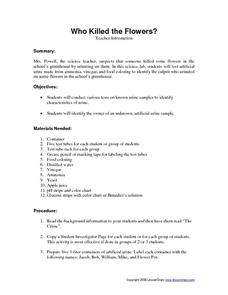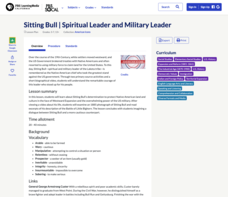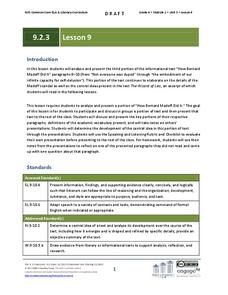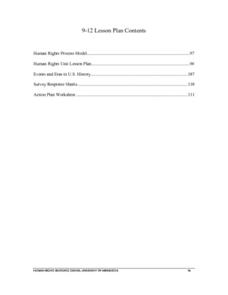Centers for Disease Control and Prevention
Measuring Bullying Victimization, Perpetration, and Bystander Experiences: A Compendium of Assessment Tools
Designed to provide tools to assess a range of bullying experiences, from perpetrators, to victims, to bystanders, the assessment tools in this packet asks pupils to rate themselves as bullies, victims, and/or bystanders. There are also...
Echoes & Reflections
Perpetrators, Collaborators, and Bystanders
After the Holocaust, the world grappled with how to bring justice to the Nazis. But what to do with the thousands—if not millions—who allowed it to happen? Young historians consider the issues of guilt, collaboration, and responsibility...
Curated OER
Rethinking Perpetrators, Bystanders and Rescuers: The Case of Max Schmeling
The focus of this lesson is personal choice and how changing circumstances can affect one person's ethical choices. During the Holocaust, people made choices, and by placing individuals in the appropriate historical context students can...
Curated OER
Tax Jeopardy
Create a glossary of tax-related vocabulary and clip New York Times articles that present tax procedure in action, in preparation for participating in a tax quiz bowl. Young economists explore allegations that "Survivor" Richard Hatch...
Echoes & Reflections
The "Final Solution"
Nazi policies shifted from deportation and imprisonment to extermination of the Jewish people in death camps in the "Final Solution." Learners examine photos of artifacts, read poetry written by survivors, analyze testimony from...
Curated OER
Human Rights Education Handbook: Perpetrator, Victim, Bystander, Healer
Young scholars describe a time when they played different roles regarding human rights. They are divided into small groups and assigned roles of "Perpetrator," "Victim," "Bystander," and "Healer." Individual students give an example of a...
Learning to Give
What Are Your Thoughts?
The varying responses of the characters in Mildred Taylor's Roll of Thunder, Hear My Cry to the discrimination they experience or perpetrate provides readers with an opportunity to not only examine the feelings of the characters but to...
Lesson Snips
Who Killed the Flowers?
This could be really good, or it could be really bad! The crime to be solved is, "Who went pee in the flowerpot?" Given four imitation urine samples, young chemists or crime scene investigators perform pH, glucose, and turbidity tests to...
Kenan Fellows
Unit 2: DNA Analysis
Ever wonder how they solve those mysterious murders in TV crime dramas? The second of four units in a Biotechnology series introduces scholars to the many methods of DNA analysis. Pupils create and run their own gel electrophoresis...
PBS
Sitting Bull: Spiritual Leader and Military Leader
Sitting Bull was not expected to be a great warrior. Yet, he led the Lakota people and other tribes to several pivotal victories against the United States government when federal troops threatened their land. Using primary sources, such...
Facing History and Ourselves
The Costs and Benefits of Belonging
Peer pressure and the desire for acceptance are powerful things. A thought-provoking lesson looks at the positive and negative effects of wanting to belong to a group. Class members examine the roles of the perpetrator, the victim, the...
Curated OER
Cyberbullying and Civic Participation
Encourage your class to create rules and regulations for cyberbullying. Learners explore civic participation by thinking about the rules and regulations already in place in their lives and studying Canada's Canada Gazette. As a final...
Echoes & Reflections
Rescuers and Non-Jewish Resistance
What does it mean to be a rescuer during the time of the Holocaust? Learners consider the role of those who resisted the Nazi invasions, including hiding Jewish people, throughout Europe. Activities include listening to the testimony of...
Curated OER
Restorative Justice
Sixth graders study restorative justice. In this government lesson, 6th graders discuss restorative justice, examine the ways restitution can be made when a crime occurs, and write about a conflict at home or school and describe how it...
Curated OER
Ghosts of Rwanda: Reconciliation and Reparations
Students examine a specific case of genocide participation in Rwanda. Working in groups, they simulate the courtroom drama, from the positions of victim, perpetrator, and court monitor. They conclude by writing essays on the...
Curated OER
The Holocaust: Media Anchors
Learners explore the Holocaust by reading the book "Until We Meet Again" and viewing the film "Devil's Arithmetic". They identify the political, economic and social context of the Holocaust and complete a research project on a real...
Curated OER
Rethinking Perpetrators, Bystanders, and Rescuers: The Case of Max Schmeling
Students examine the life and actions of Max Schmeling during World War II. They read and analyze an article, compare/contrast Schmeling's choices with other people during this time period, and write a journal response.
Curated OER
Genocide in World War II
High schoolers access a variety of websites that explore the Nazi German genocide of Jews in WWII. They view a film, complete a worksheet and write an opinion paper supporting the view to either punish or forgive the perpetrators of...
EngageNY
Grade 9 ELA Module 2, Unit 3, Lesson 9
Are we interested in crime stories because we either identify with the victims or enjoy watching the rich suffer? Do we feel guilty and want someone to take our blame and let us feel innocent? Groups investigate how the author of "How...
Curated OER
Life Science: DNA Whodunit?
Young scholars role play an honorary detective to assist in solving a crime committed. They investigate by a bank robbery and interview eyewitnesses using their Crime Investigation Notebook and clues from an eyewitness account from the...
Curated OER
DNA Fingerprinting Simulation
In this DNA fingerprinting simulation worksheet, students perform an activity that represents using a gel electrophoresis. Students decide who commits a crime in a forensics style lab.
Curated OER
A Modern Connection to Genocide
Students investigate the genocide that occurred in Rwanda. They read and discuss an article, watch a Frontline video, complete a worksheet for the video, and write a letter to the Rwandan government or United Nations about the...
Curated OER
Auschwitz Episode Guide: Corruption
Students examine life at the Auschwitz concentration camp. They watch and discuss a PBS documentary, analyze reasons for prosecuting perpetrators after the war, and develop criteria for recognizing Internet sites developed by Holocaust...
Curated OER
Social Studies: Human Rights Then and Now
Students examine past and present human rights issues in U.S. history. In reflection journals, they document both justices and injustices perpetrated on groups and individuals. Finally, students implement an action plan designed to...

























